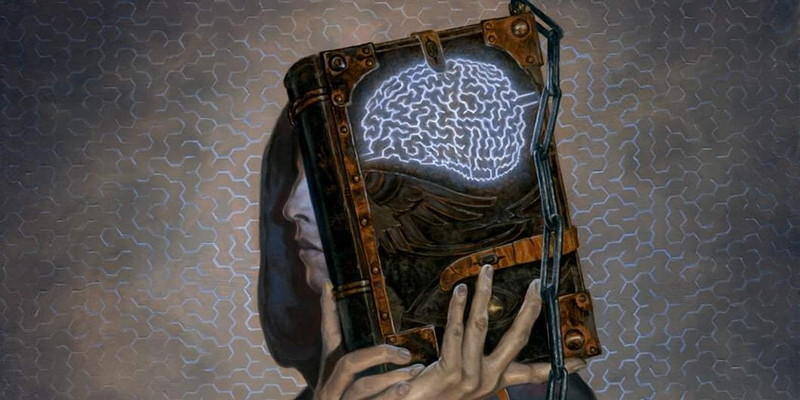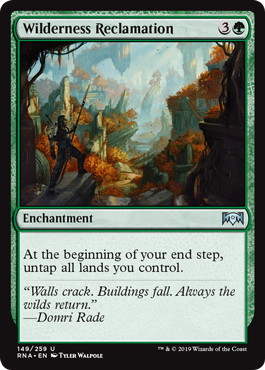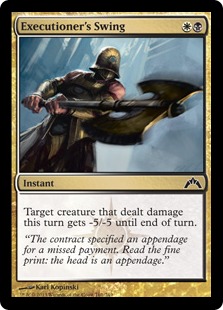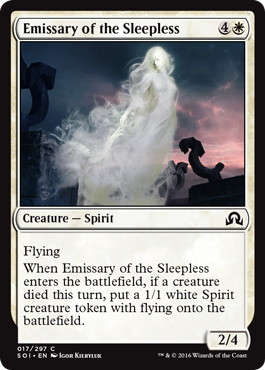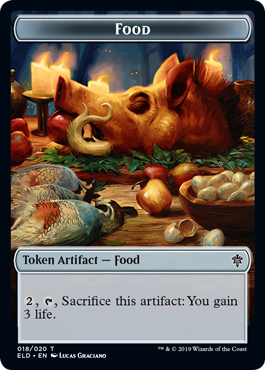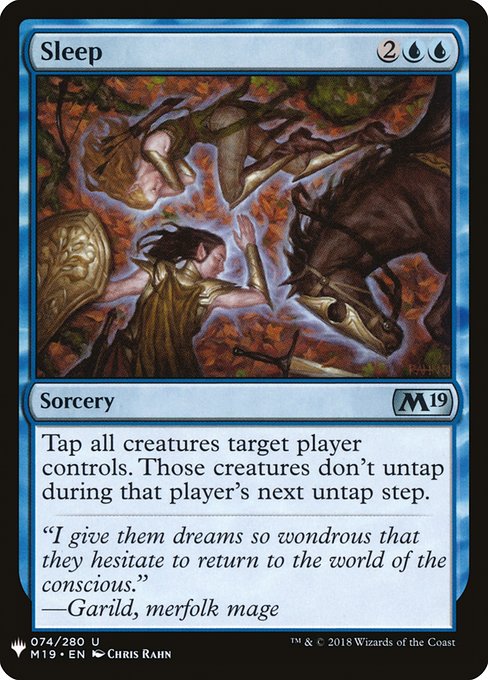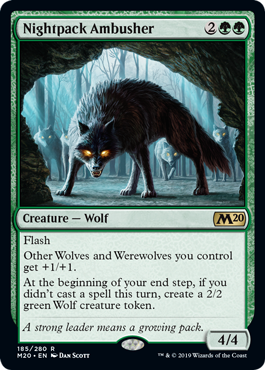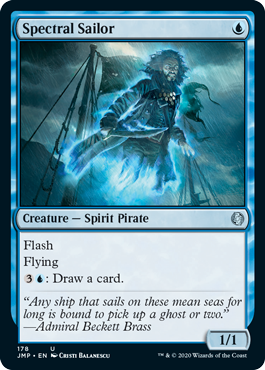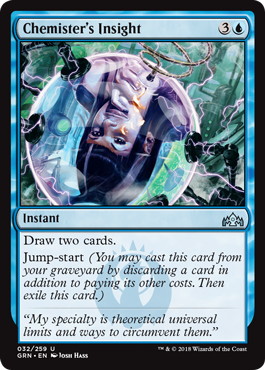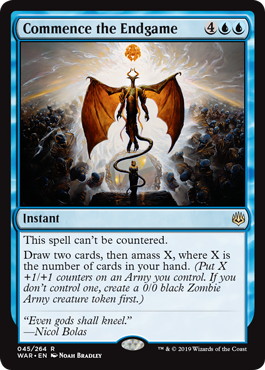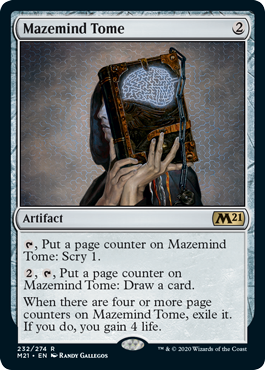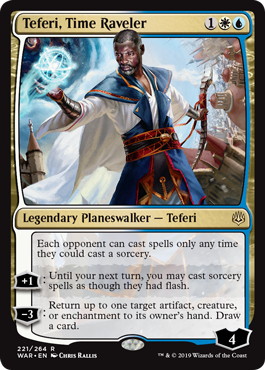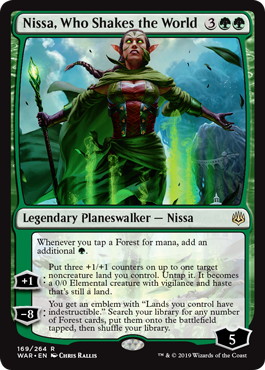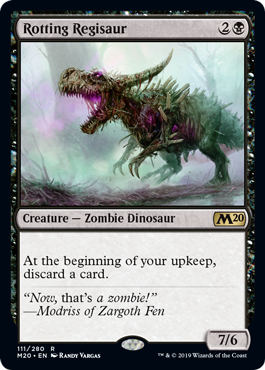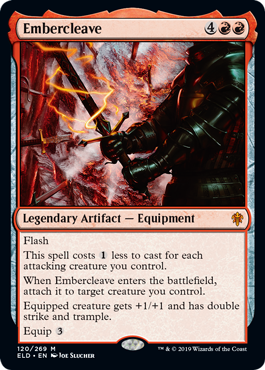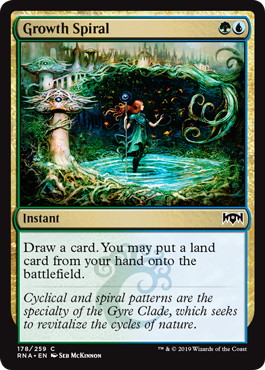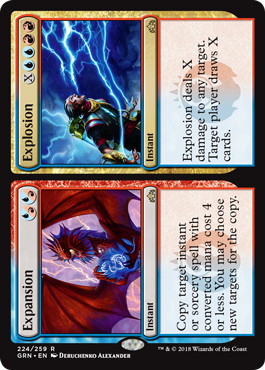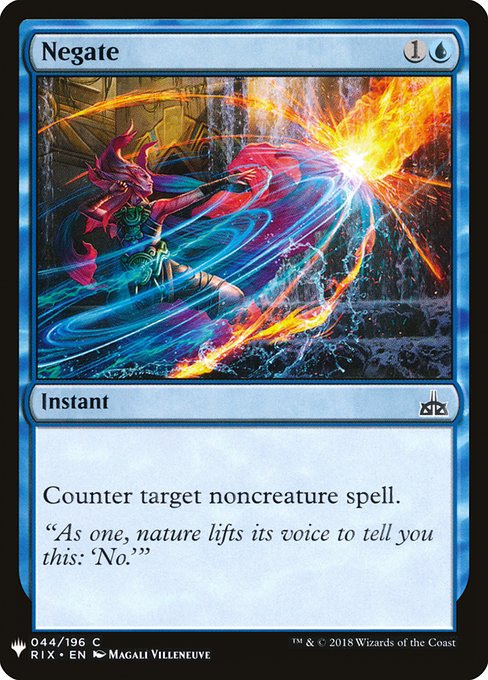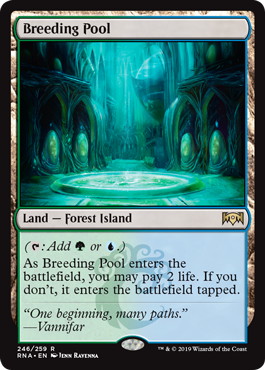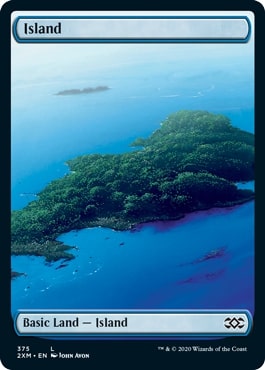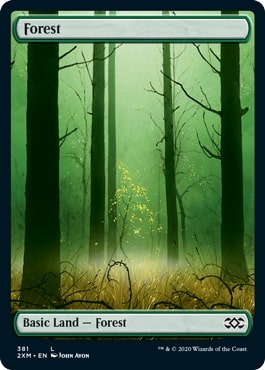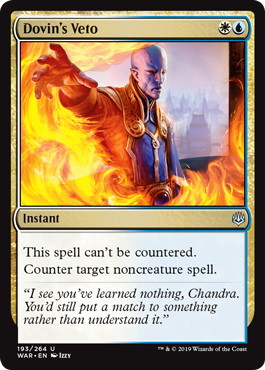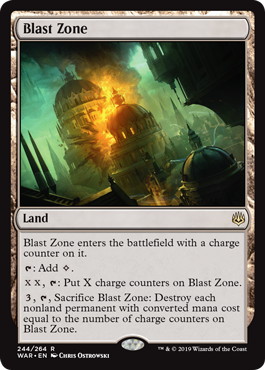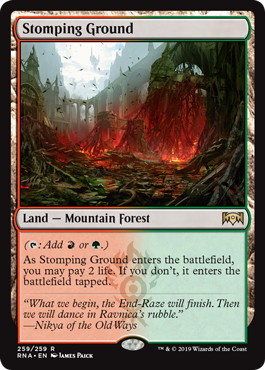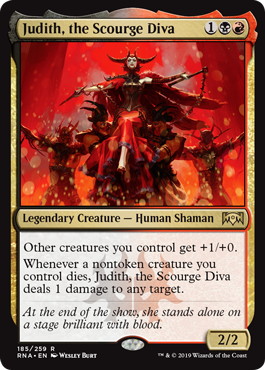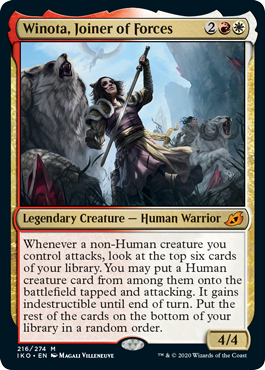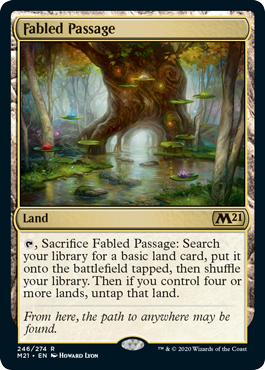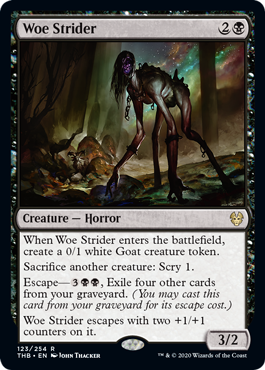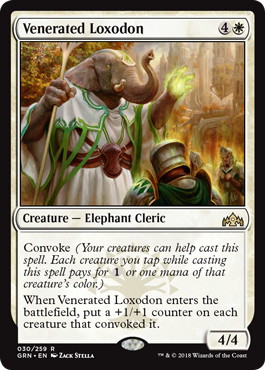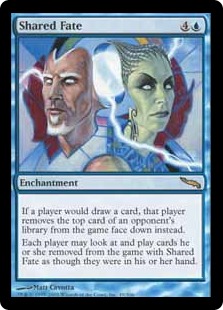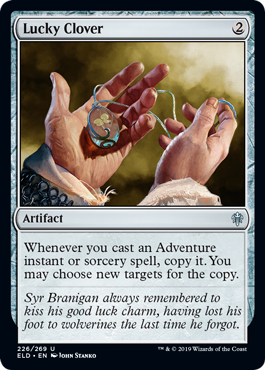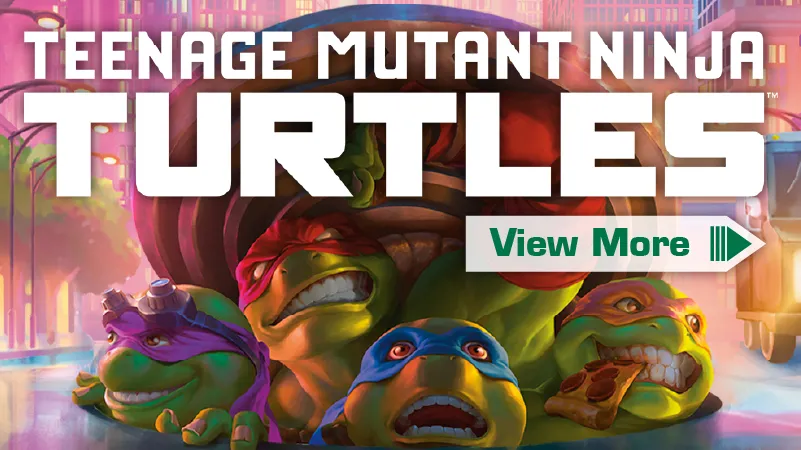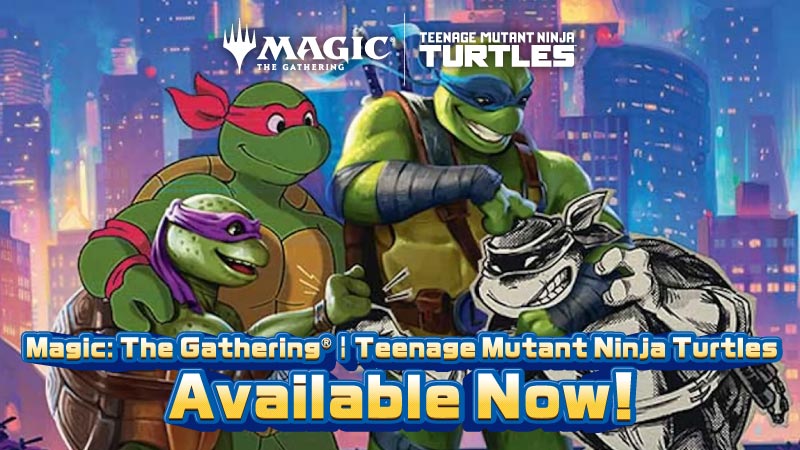Introduction
I wasn’t planning on testing much for the Players Tour Finals(PTF). My last article was on my 20-ticket Commander decks because that’s all the Magic I’d been playing. But when testing kicked into gear, I inevitably got sucked in again. Even with bad formats and turbulent organized play, no experience comes close for me to solving a format with friends.
Granted, there wasn’t much format to solve this time. Temur Reclamation was the heir apparent to 《Fires of Invention》 and it was a peaceful succession. No matter how much we skewed our Reclamation lists for the mirror and our other decks for Reclamation, Reclamation still won.
At one point in testing, Nathaniel Knox had turn 3, 4, and 5 《Rotting Regisaur》 against me with Rakdos Sacrifice. 《Growth Spiral》 into 《Wilderness Reclamation》 plus 《Expansion/Explosion》 was better, despite my 10 maindeck counterspells and no removal. After the first week of exploration, barring a minor detour into Mono-White, we focused our efforts entirely on Reclamation.
The PTF carried strong echoes of Regional Players Tours Phoenix(RPT) for me. For the online PTs(PTO), I really did not want to play 《Wilderness Reclamation》, mostly because I didn’t understand the mirror, so I registered an overspecialized Bant list aimed at a nonexistent metagame.
For the PT Finals, I just put the work in. As a team, we battled hours of mirrors each day and tried every legal Temur card at one point or another. Our list and gameplans were clean, which manifested in my Top 8 and Austin Bursavich’s Top 16. Some lessons just take more than one beating.
I’m writing this report the Tuesday after the top 8 playoff and, appropriately, 《Wilderness Reclamation》 and 《Growth Spiral》 have already met the executioner. Wizards acted so suddenly that some players had their deck banned between rounds of a tournament. Because the deck and format have violently departed, I’ll focus on the learnings I’ll carry forward to future tournaments. That’s what I wanted to write about anyway, so I’m grateful for the excuse.
Travel Preparations
The night before the online RPT, I stayed up until 5am when the tournament started at 9am just because I couldn’t sleep. I woke up at 8:50am, foggy and hungry, and immediately sat at my desk for the first round. I snacked between rounds, but adrenaline kept me from consuming enough calories to actually function.
Many factors determined my middling finish in that tournament, but lack of food and sleep were big ones. I hadn’t appreciated how I’d been relying on the exhaustion from traveling to fall asleep before Magic tournaments. Without it, I couldn’t stop sideboard plans and turn sequences and past games from racing through my head.
Before all 3 days of the PTF, I biked a 14 mile loop to exhaust myself, buying bagels, salmon, and eggs after. Getting to sleep was still troublesome, but I went under at 1am instead of 5am. Then I woke up an hour early to make breakfast, eat, and meditate. I went on a walk every other round. I was calmer and more focused, and I needed the help for the 10 Reclamation mirrors I played.
I’m known in my friend group for joking that the only thing more overrated than practice is sleep, and heuristics and pattern recognition do cover 90% of scenarios. Spend all your mana, don’t not spend your mana. However, matchups like the Reclamation mirror require endurance and attention. When I’m tired, I lean so hard on my autopilot that I can’t see my mistakes, let alone avoid them.
Food and sleep are the two biggest holes in my Magic game – I feel drained and nauseous before, during, and after Magic tournaments. Despite that, I’d never thought to actually work on them before. I’m excited these first efforts went well, and I’ll be continuing and evolving my routine.
Bluestar Airlines
In epsilon-greedy exploration, a reinforcement learning agent mostly takes the best known game action, but will sometimes act totally randomly. Following this strategy, the agent spends most of its time exploring the most promising branches of the decision tree, but the periodic random excursions keep it from getting stuck on merely good branches when greater rewards lie elsewhere. This paradigm is deceptively powerful – even AlphaZero was trained with variations on epsilon-greedy exploration.
The most pervasive mistake that Magic players make is getting stuck on best plays that aren’t actually best, without ever trying the alternatives. Sure, it’s usually right to play draw-go in the Reclamation mirror, but what happens if you just jam?
When I started testing the mirror against Mattia Rizzi, Topher Babian, and Austin Bursavich, I just couldn’t win. I lost to 《Wilderness Reclamation》s when I tapped out and 《Shark Typhoon》s when I didn’t, I never won a fight over Reclamation on either side, and my 《Nightpack Ambusher》s got 《Aether Gust》ed into oblivion while theirs swarmed me.
At some point, I decided that whatever play I wanted to make, I’d make another one. Instead of waiting until I could play 《Nightpack Ambusher》 with countermagic up, I’d jam it on turn 4. Or instead of boarding 《Nightpack Ambusher》 in and playing the flash game, I’d leave more 《Wilderness Reclamation》s and 《Expansion/Explosion》s in instead.
Most of these branches snapped, but some represented major breakthroughs. And eventually, keeping what was useful and discarding the rest, I started winning.
The Bones of What You Believe
At one stop during my travels, I cut all of the card drawing from my Reclamation list. I got tired of 《Narset’s Reversal》 on my 《Commence the Endgame》s, 《Spectral Sailor》 was a 9-mana 《Divination》, and 《Chemister’s Insight》 was vulnerable to both 《Mystical Dispute》 and 《Expansion》.
Doing this, I discovered that the card advantage spells were actually key. None of them were particularly good, but having ways to get ahead when neither player could resolve 《Expansion/Explosion》 frequently decided games.
Desperate for alternatives, I did a Scryfall search for every card in Standard with the word “Draw” on it. When I posted the list to our Discord, Mark Jacobson immediately pointed out that I’d missed 《Mazemind Tome》. It was love at first sight.
《Mazemind Tome》 is neither efficient nor good, but it was better than the alternatives. Finishing the 《Mazemind Tome》 costs 10 mana and nets 3 cards, where you’d need 17 mana to get the same benefit from 《Spectral Sailor》. 《Commence the Endgame》 is the best deal at net 2 cards for 6 mana, but it has a game-ending vulnerability to 《Narset’s Reversal》. 《Mazemind Tome》 can dig for lands even when mana is tight, and the 《Sacred Nectar》 at the end helps fend off 《Shark Typhoon》s.
The public verdict on 《Mazemind Tome》 is permanently out with the 《Wilderness Reclamation》 banning, but I still see it as a significant innovation. By experimenting and stripping the matchup down to its underlying machinery, we were the only team to identify the least rotten apple.
Finches
The biggest problem with our team’s PT Online testing was inbreeding. It was the same format as the PT Finals, and we similarly identified Reclamation as the best deck.
Notably, we found that Reclamation could reliably beat 《Teferi, Time Raveler》 with counterspells, 《Blast Zone》, and 《Shark Typhoon》, and Bant was only favored with maindeck counterspells and defensive 《Shark Typhoon》s. These Bant configurations did beat Reclamation, but at the cost of every other matchup. We assumed the field would be upwards of 50% Reclamation and skewed our lists accordingly.
The first week of PTOs lined up with our predictions, but the second week diverged wildly. Most people showed up with tapout Bant or Aggro to beat Reclamation instead of Reclamation itself, even though Reclamation was actually favored in those matchups.
For the PT Finals, we predicted Reclamation would be even more represented and skewed our lists even further. But this time we were right. 《Growth Spiral》 was 70% of the field, like we expected, and we rightly had no dead cards in our maindeck. I arguably should have skewed my list even further like Austin did, maindecking 《Commence the Endgame》 instead of 《Nightpack Ambusher》.
For the PTOs, we failed to account for how large and diverse the field was. People qualified for the PTOs through Limited, Pioneer, Modern, and probably even Legacy. I imagine many people didn’t test much, and didn’t test well. We shouldn’t have expected the field to come to the same conclusions that we did.
On the other hand, it was right to expect our PT Finals opponents to put in the same work and to make the same judgments. It’s easy to forget that Magic isn’t just cards and formats, but also people.
Fail Fast
In the Swiss rounds of the tournament, I made 3 major mistakes. I probably made more, but I noticed 3.
The First Mistake
The first was in round 4 against Andrew Cuneo on Mono-Green. Postboard, I kept 4 lands, 《Expansion/Explosion》, 《Shark Typhoon》, and 《Nightpack Ambusher》 on the draw, reasoning that my hand was a 2 mana interactive spell away from having a decent curve. There were two major flaws with my reasoning.
The first was that even though I had a curve, my spells weren’t good. A 1/1 Shark isn’t much better than nothing and while 《Nightpack Ambusher》 is a strong card in the matchup, it’s weaker on the draw and particularly without 《Growth Spiral》.
The second was that I just didn’t have my good cards. 《Wilderness Reclamation》 or 《Growth Spiral》 are the two best cards in the matchup, and the hand had neither.
The Second Mistake
The second was in round 7 against Kristof Prinz. On the play in game 2, my hand was 《Mazemind Tome》, 《Growth Spiral》, 《Negate》, 《Negate》, 《Breeding Pool》, 《Island》, 《Forest》 with a 《Ketria Triome》 in play vs. a tapped 《Raugrin Triome》.
I chose to play 《Growth Spiral》 instead of 《Mazemind Tome》, reasoning that I’d be able to play 《Mazemind Tome》 with both activation and 《Negate》 up next turn. That would have been the correct play in the strict mirror, where I’d be able win a fight over 《Mazemind Tome》 on turn 3 while still being safe from an opposing 《Wilderness Reclamation》.
As is, Kristof had 《Dovin’s Veto》 for my 《Mazemind Tome》 and then I just didn’t have a gameplan.
The Third Mistake
The third mistake was in round 9 against Pascal Vieren. In game 2, after a long, tense middlegame, I had a 《Wilderness Reclamation》, a 2/2 Shark, and 6 lands versus 5 untapped lands, 《Uro, Titan of Nature’s Wrath》, a 3/3 Shark, and 2 fresh cards from a 《Chemister’s Insight》. My hand was 2 《Expansion/Explosion》 and 《Uro》 and I was at 5 life versus 20-something.
I went to my end step and cast 《Explosion》 for 6 on Pascal’s 《Uro》, leaving up 2 mana for 《Expansion》. Pascal 《Mystical Dispute》 the 《Explosion》, and I lost.
This last scenario is more borderline than the first two, since the upside of resolving the 《Explosion》 on the 《Uro》 is so high. I deny him a card and get an additional card myself, and his hand is 2 completely random cards. If he had any interaction except exactly 《Mystical Dispute》, my line was better.
Even so, I believe my play was a clear mistake. If I 《Explosion》 the Shark for 5 instead, then 《Expansion/Explosion》 resolves against any 1 piece of interaction. With my own 《Uro》, 《Wilderness Reclamation》, and the second 《Expansion/Explosion》 in hand, I’d be an overwhelming favorite even with the additional 《Uro》 trigger.
Diagnosing why I made these mistakes is hard. I just didn’t think these scenarios through, sure, but why these and not others?
The first two, I probably got too comfortable playing Reclamation mirrors and didn’t appropriately check my intuition.
The last mistake concerns me more, since I spent a solid two minutes thinking about how much to Explode for and still reached the wrong conclusion. I maybe should have focused more on the magnitudes the risks and rewards rather than the probabilities.
Sharknado: Shark Explosion
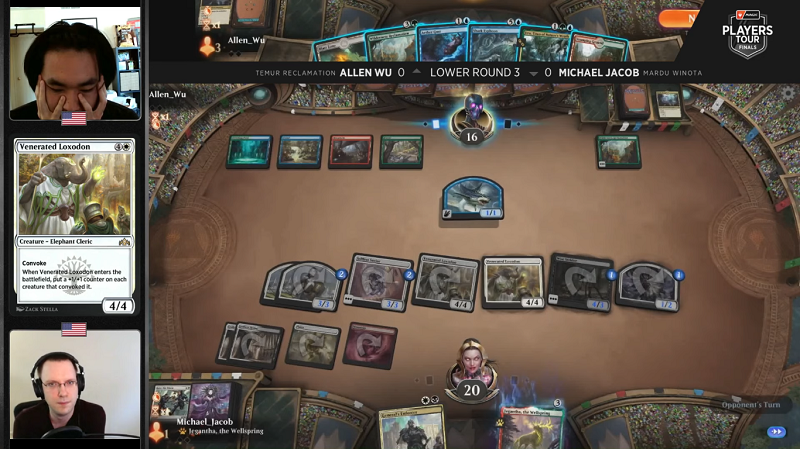
Quoted from Youtube
In game 1 of my second match against Michael Jacob with Mardu Winota, I’m facing a board that will certainly kill me in 2 attacks, but I can survive 1 attack with 2 blockers. I have 《Wilderness Reclamation》, a 1/1 Shark, and 4 lands plus a land drop with a hand of 《Blast Zone》, 《Stomping Ground》, 《Aether Gust》, 《Uro, Titan of Nature’s Wrath》, 《Wilderness Reclamation》, 《Shark Typhoon》. You can find the game state on coverage here.
I certainly have to play 《Wilderness Reclamation》 and cycle 《Shark Typhoon》, since my only out is drawing 《Expansion/Explosion》 with both 《Wilderness Reclamation》s in play. But I still need to figure out how big to make my Shark.
This turn, I’ll have 10 or 11 mana, depending on whether I play 《Blast Zone》 or 《Stomping Ground》. I must play 《Stomping Ground》 tapped in order to survive the first attack. Next turn, with 6 lands and 2 《Wilderness Reclamation》s, I’ll have 17 or 18 mana, based on my prior land choice. So 28 mana total. With the additional costs for 《Shark Typhoon》 and 《Explosion》, I can deal 22 damage.
Ultimately, I played 《Stomping Ground》 tapped, made a 6/6 Shark, and left 《Aether Gust》 up. This line survives against 《Winota, Joiner of Forces》 or 《Judith, the Scourge Diva》 but needs to draw 《Expansion/Explosion》 in its cycle or draw step.
Alternatively, I could have played 《Blast Zone》 and made a 9/9 Shark. Although that line dies to a red anthem, the 3 extra mana means I’d get another look at 《Expansion/Explosion》 with 《Uro, Titan of Nature’s Wrath》 if I peel a 7th land.
I didn’t think MJ had an anthem, since he would have played it instead of the second 《Venerated Loxodon》. From his perspective, 《Mystical Dispute》 beats 《Woe Strider》 into 《Venerated Loxodon》 as well and an anthem shortens the clock by a full turn through a 《Aether Gust》.
But even if we assume MJ doesn’t have an anthem, he’s still 14.29% to draw one. Intuitively, I didn’t think a single draw conditioned on finding a 7th land could be better than playing around a topdecked anthem plus a potential slowroll.
What do the numbers say? Writing a simple simulation, we find that making a 6/6 wins 17.04% of the time and making a 9/9 wins 19.36% of the time. The probabilities of winning level out when MJ has an anthem a quarter of the time, which means my prior on MJ’s holdings would need to be at least 12.50% for making a 6/6 to be the better play. It’s possible that MJ didn’t think things through and held an anthem, but definitely not 1/8th of the time. From the math, making a 6/6 was a clear mistake.
My top 3 cards were 《Nightpack Ambusher》, 《Wilderness Reclamation》, and 《Fabled Passage》, so I would have lost no matter what I did.
The Garden of Forking Paths
I didn’t play the arena open this weekend for a few reasons, but I just want to say I’m loving the posts about people not making day 2.
— Jacob Nagro (@JacobNagro) August 2, 2020
On the same note I’m really not a big fan of tournament winners constantly claiming they did well because of perfect deck choice/play.
My friend Jacob Nagro recently tweeted about how he dislikes that Magic players only talk about how good their deck was or how well they played when they succeed in tournaments. I agree, to an extent. At the same time, what else is there to talk about?
Going back to my game against MJ, it’s worth noting he kept 2 《Venerated Loxodon》s, 《Woe Strider》, and 3 lands. He had 4 《Raise the Alarm》s and 3 《Lazotep Reaver》s to enable a turn 3 《Venerated Loxodon》, so a 25.34% of finding one in 2 draws. If MJ doesn’t hit, then I have time to make 2 big Sharks and outrace him.
The alternate universe where I win that game isn’t so different. If MJ misses his weighted coin flip or I hit mine, drawing 《Expansion/Explosion》, then I’m through to the loser’s final. Magic tournaments are entirely these minuscule twists and turns of probability, sifting winners from also-rans. Those particular flips landed against me, but countless others went in my favor. I mulliganed maybe 5 times the whole tournament.
None of that is interesting though. I got lucky in this tournament, and I’ve gotten unlucky in others. I’m far more invested in the alternate universe where I made the 19% play instead of the 17% one.
Mirror, Mirror
When people talk about Magic skill, they don’t distinguish between gameplay, sideboarding, deck selection, metagame prediction, etc. They regard skill as a monolith, something abstract and intangible that the best players simply have. This discourse isn’t merely reductive, but actively counterproductive.
Most skills in Magic actually reduce the skill in gameplay. For example, if you predict the metagame perfectly and identify the best deck to combat it, you won’t need to play well to succeed since you’ll mostly face favorable matchups. You often even remove your opponent’s skill from the equation.
I was most lucky this tournament not because of how well I drew or how many die rolls I won, but because I got to play a solved format with a complicated best deck. My best skills are navigating games and sideboarding; my worst, by a lot, is deck selection. The ideal tournament for leveraging my strengths and avoiding my weaknesses would be all 75 card mirrors, and the PTF wasn’t far from that.
Even If You Beat Me, I’m Still the Best
I wasn’t totally sure why I was still playing Magic until I read Sally Rooney’s essay on competitive debate, “Even if you beat me”. I still enjoy playing Magic, though at this point I’d rather read, bike, or play other games. And in the final tally, my Magic accomplishments won’t sum to much.
At the same time, we make our own meaning. I’m too good to quit, and I want to prove it while I still have the time, agility, and opportunity. If I’d done poorly in the PTF, I would have been done with Magic until at least the end of the pandemic. But now I have two more opportunities to beat the toughest competition out there.
If I’m not the best, I will be.
Thanks for reading, as always. And remember: be kind, for everyone you meet is fighting a hard battle.
Allen Wu (Twitter)


